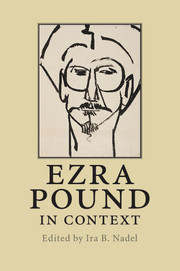Book contents
- Frontmatter
- Contents
- Notes on contributors
- Acknowledgements
- Chronology
- List of abbreviations and note on references to The Cantos
- Introduction
- Part I Biography and works
- Part II Historical and cultural context
- 16 The classics
- 17 Provençal and the troubadours
- 18 Dante and early Italian poetry
- 19 America
- 20 Venice
- 21 London
- 22 Paris
- 23 Rapallo and Rome
- 24 Pisa
- 25 Imagism
- 26 Vorticism
- 27 Music
- 28 Visual arts
- 29 Confucius
- 30 The Orient
- 31 Little magazines
- 32 Publishing and publishers
- 33 Modernism
- 34 Fascism
- 35 Anti-Semitism
- 36 Gender and sexuality
- 37 Race
- 38 Travel
- Part III Critical reception
- Further reading
- Index
19 - America
Published online by Cambridge University Press: 05 July 2014
- Frontmatter
- Contents
- Notes on contributors
- Acknowledgements
- Chronology
- List of abbreviations and note on references to The Cantos
- Introduction
- Part I Biography and works
- Part II Historical and cultural context
- 16 The classics
- 17 Provençal and the troubadours
- 18 Dante and early Italian poetry
- 19 America
- 20 Venice
- 21 London
- 22 Paris
- 23 Rapallo and Rome
- 24 Pisa
- 25 Imagism
- 26 Vorticism
- 27 Music
- 28 Visual arts
- 29 Confucius
- 30 The Orient
- 31 Little magazines
- 32 Publishing and publishers
- 33 Modernism
- 34 Fascism
- 35 Anti-Semitism
- 36 Gender and sexuality
- 37 Race
- 38 Travel
- Part III Critical reception
- Further reading
- Index
Summary
“The most American thing that ever lived,” said Dorothy Shakespear Pound about her husband. Pound cherished his citizenship as an immutable fact, even when accused of treason. Among Americans he greatly admired, Henry James and T. S. Eliot became British subjects, and James Abbott McNeill Whistler disavowed his birthplace of Lowell, Massachusetts, claiming instead St. Petersburg, Russia. But Pound never considered denying his nationality in any way. And his native land was always in his thoughts all of his long life. He wrote to William Carlos Williams in January 1935: “A man's physical presence is infinitely less than his imaginative presence…I am much more present in Rutherford at this moment than in Chiavari or in the next valley” (EP/WCW, 157). In his quaint sliver of an autobiography, “Indiscretions; or, Une Revue de Deux Mondes” (1923), Pound boasts and apologizes in the same sentence: “It's one thing to feel that one could write the whole social history of the United States from one's family annals, and vastly another to embark on any such Balzacian and voluminous endeavor” (IND, 6).
Pound's American roots and character, and his virtues and flaws, achievements and failures, as well as those of his country, require a canvas as large and grand as the continent itself, but here are some fragments on a miniature scale. Figuratively speaking, the tense interplay between the poet and American institutions can be dubbed bipolar, that is, highly emotional and sometimes irrationally manic or depressive behavior on both sides. At times the poet was a complete Yankee Doodle Dandy, in the best sense, though the feather in his hat was not macaroni but macaronic (a mixture of languages). In 1912 he stated his belief in the inevitability of “our American Risorgimento,” which “will make the Italian Renaissance look like a tempest in a teapot” (SL, 10) and he worked selflessly toward that goal as long as possible. At the other extreme, he said of Mauberley, “he had been born / In a half savage country, out of date” (P, 1990, 185).
- Type
- Chapter
- Information
- Ezra Pound in Context , pp. 202 - 220Publisher: Cambridge University PressPrint publication year: 2010
- 2
- Cited by

